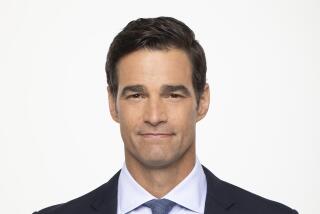STAGE REVIEW : Pacino in ‘Salome’: Right Actor, Wrong Play
“Whaaaar is Saahl-o-may? ... Whaaaar is th’ prinzess?”
Yes, Al Pacino is out there, loose, in the dramatic literature again--an escapade that is always an Event, frequently a hoot and certainly never a textbook lesson in period style.
This time, he plays Herod--imagine Scarface as a biblical Klingon--in Oscar Wilde’s “Salome.” Then try to imagine the meeting that might have seduced Pacino into his own fund-raising season for Broadway’s Circle in the Square Theater, a conversation that might have begun: “OK, Al, what’s the strangest thing you ever wanted to do onstage that nobody would let you try?”
The result is a truly weird, intense, goofy and mesmerizing performance by Pacino in a big, dead-serious production that, well, gives us more than half an hour to ponder Pacino’s career motivations before Herod finally sweeps on to harass young “Saahl-o-may” (Sheryl Lee, who played Laura Palmer in television’s “Twin Peaks”) and to liven things up for us all.
“Salome,” of course, is the Wilde play Richard Strauss used almost verbatim for his harrowing opera but which, for reasons we now understand, seems to have been produced in New York only in 1922, 1923, 1931 and, with James Coco as Herod, 1956. Wilde wrote it in 1893, two years before “The Importance of Being Ernest,” two years before his incarceration for “moral offense,” and the English had the thing banned for being sacrilegious and the devil knows what else.
With its perfumed decadence in Victorian England, the script must have been a stunner. With its windy rhetoric and florid unstageability, it now seems pretty silly and senseless--the overheated story of history’s worst teen crush in bad poetry.
“I am amorous of thy body!” says Salome, squirming toward John the Baptist, named Jokanaan but pronounced here as Jokanin and Yokanin, depending on who is talking. “Back, daughter of Babylon!” commands the prophet, played by Arnold Vosloo as a sort of bare-bunned Rasputin.
Lee, in her Broadway debut, is game as Salome, the pure object of Herod’s obsession and a woman driven mad by the piety of the prophet. Despite an admirable lack of inhibition and obvious dance training, however, Lee is pretty much of a stiff. Her dance of the seven veils, choreographed by Lar Lubovitch, begins promisingly--each veil devoted to a separate body part. But there are diminishing emotional returns as the veils peel off--yes, they all come off--and the controlled frenzy degenerates into flails and shimmies.
“Salome” is the first in Pacino’s two-play repertory season benefiting the theater. And although everyone is reportedly working for minimum, this is no cheap production. There are 23 actors, complete with soldiers, slaves, Nazarenes, Jews and fancy spear carriers. Esai Morales, as a Syrian soldier in love with Salome, kills himself early, which is no loss.
Zack Brown’s huge bronze sculptural set has two curvy platforms and his costumes--for those who get to wear much costume--are gold, black and heavy-metal in the pre-1970s sense of the term. And Robert Allan Ackerman, who directed “Bent” on Broadway and “Extremities” Off-Broadway, has everyone playing Cecil B. DeMille, with bare chests and affected declamations--and people looking straight at us while admiring the moon that hangs conspicuously behind them.
But, finally, Herod and Herodias arrive and everything perks up. Both Suzanne Bertish, best known from the Royal Shakespeare Company’s “Nicholas Nickleby,” and Pacino spread their legs apart, lean back on their spines and observe the proceedings like Method actors pretending to be trolls. Bertish’s Herodias is the merciless pragmatist, the only one who knows “The moon is the moon, that is all.”
Pacino, in a long black robe and plenty of jewelry, puts his thumbs on his waist, camps it up with playful swagger and a slight effeminacy that, at times, falls somewhere between “I, Claudius,” Richard Dreyfuss’ gay “Richard III” in “The Goodbye Girl” and a big, restless bird. The accent is hopeless; the style, a travesty.
And, yet, his intelligence, his need to act, overwhelms reasonable resistance and rivets the attention to him. Even when he’s wrong--and, boy, is he wrong here--he’s irresistible.
More to Read
The biggest entertainment stories
Get our big stories about Hollywood, film, television, music, arts, culture and more right in your inbox as soon as they publish.
You may occasionally receive promotional content from the Los Angeles Times.






